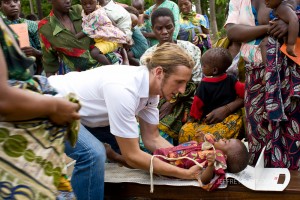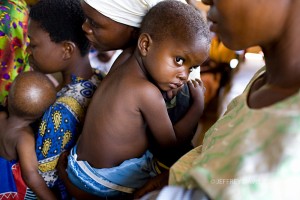Project Peanut Butter: Help Us Address Childhood Malnutrition with the Dutasi Documentary Project
I’m grateful for your support of my work, online courses, and books, and want to devote this article to describe a mission that means so much to me. If you appreciate our work here at Gottfried Institute, I ask that you show your support by considering a small donation to Project Peanut Butter. What follows is a brief introduction of why we’ve chosen to donate a portion of our post-tax income to Project Peanut Butter, along with a longer description by my friend Jeffrey Davis, a documentary filmmaker and photographer who will be filming health care professionals, volunteers, children, and families in Sierra Leone from October until January 2017. Jeff is filming stories of transformation and hope as Dr. Manary’s health care teams endeavor to provide life-saving treatment to malnourished children.
Malnutrition is the leading cause of death for children worldwide, and Dr. Mark Manary has a proven solution. He is a professor of Pediatrics at Washington University School of Medicine who runs an international nonprofit to provide desperately-needed nutritional and medical support to children in sub-Saharan Africa. As the founder of Project Peanut Butter, he and his team helped invent a smart therapeutic food, which is a nut, milk powder, oil, vitamin, mineral, and sugar based, ready-to-use, supplementary food referred to as RUTF (or RUSF). His randomized trials show high recovery rates and improved growth, and his methods have been refined carefully over the past 12 years.[1] RUTF has been shown to be safe and effective in more than 21 randomized trials, multiple observational studies, and several systematic reviews, with an overall recovery rate of 88 percent, given good implementation.[2] Furthermore, his current studies look upstream at helping women in developing countries prevent malnutrition in pregnancy, which helps prevent malnutrition in their children.[3]
Here’s the problem: only 15% of severely malnourished children receive RUTF.[4]
Together, we can spread the message about the availability and healing of this healthy food product for malnourished children and mothers. Please help me raise the funds for this important endeavor.
We hope you will find in your heart to support this work, either with a donation or by posting this blog on your social media, or both! Contributions are tax deductible (Tax ID 59-3785405). Click here to donate and indicate in the comments that your contribution is for the “Dutasi” Documentary and Advocacy Project with Jeff Davis.
Thank you.
The Dutasi Documentary Project
From Jeffrey Davis, advocate, photographer, filmmaker:
Support #ProjectPeanutButter. It has been said that next to hunger and thirst, our most basic human need is for storytelling.
~ Khalil Gibran
From July 2016 through March 2017, the Lumen Production Company (LPC) will collaborate with Dr. Mark Manary from Washington University School Of Medicine and the international nonprofit Project Peanut Butter (PPB), founded by Dr. Manary, to produce a series of short, compelling documentary stories in Sierra Leone, an area with chronic poverty and a desperate need for health care support. LPC’s video production and still photography will focus on children and families in the Pujehun region and the inspirational story of life-saving treatment for malnutrition.
Click here to review the full project overview.
If you wish to learn more about my documentary work, my websites are available at the following links: www.jeffreydavisphotography.com and www.lumenproduction.com
Contributions are tax-deductible. Thank you for your consideration.

Each child is examined with height, weight, and other considerations. In this image a volunteer doctor, Jay Reinking, works with a young girl in Malawi. If a child has severe acute malnutrition and needs RUTF therapy, PPB provides support on site and continues to review the child’s progress with weekly or biweekly exams through six to eight weeks during treatment. This image is taken in southern Malawi.

Children are examined and approvals are made for acceptance to each PPB treatment program. For direct services, PPB provides medical support and RUTF therapy, which includes nuts, milk powder, oils, sugar, vitamins, and minerals, free of charge. This image is taken in southern Malawi.
[1] http://www.ncbi.nlm.nih.gov/pubmed/26864368; http://www.ncbi.nlm.nih.gov/pubmed/26423737; http://www.ncbi.nlm.nih.gov/pubmed/25744509; http://www.ncbi.nlm.nih.gov/pubmed/25633498; http://www.ncbi.nlm.nih.gov/pubmed/25419681; http://www.ncbi.nlm.nih.gov/pubmed/23246175; http://www.ncbi.nlm.nih.gov/pubmed/20980648; http://www.ncbi.nlm.nih.gov/pubmed/23744450; http://www.ncbi.nlm.nih.gov/pubmed/19292750; http://www.ncbi.nlm.nih.gov/pubmed/19225128; http://www.ncbi.nlm.nih.gov/pubmed/18606932; http://www.ncbi.nlm.nih.gov/pubmed/17033530; http://www.ncbi.nlm.nih.gov/pubmed/15817865; http://www.ncbi.nlm.nih.gov/pubmed/14734876.
[2] http://www.ncbi.nlm.nih.gov/pubmed/20972288; http://www.ncbi.nlm.nih.gov/pubmed/25739460.